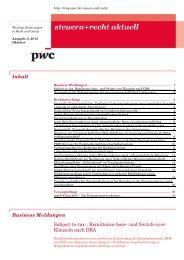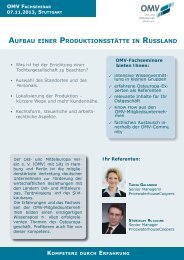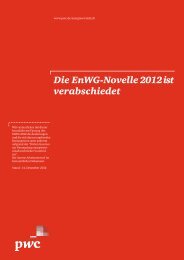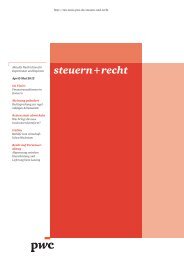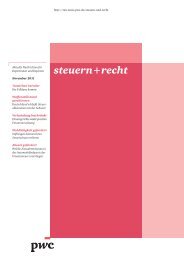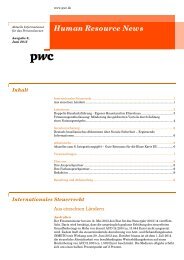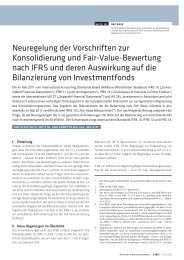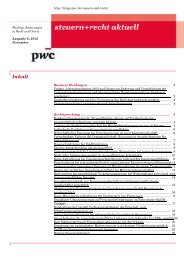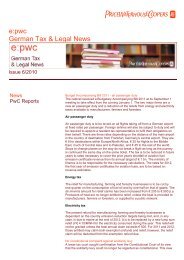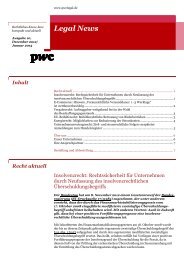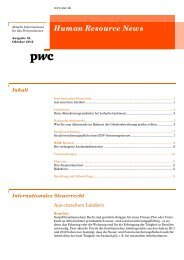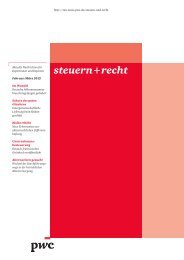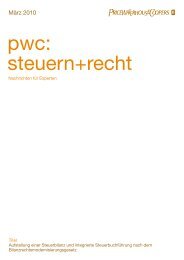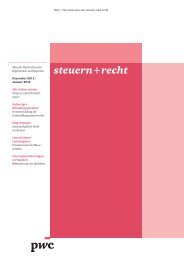Download legal-news-issue-7-2011 - PwC Blogs
Download legal-news-issue-7-2011 - PwC Blogs
Download legal-news-issue-7-2011 - PwC Blogs
You also want an ePaper? Increase the reach of your titles
YUMPU automatically turns print PDFs into web optimized ePapers that Google loves.
Statutes<br />
Cases<br />
Decrees<br />
Issue 7<br />
October 13, <strong>2011</strong><br />
<strong>PwC</strong> Reports<br />
http://tax-<strong>news</strong>.pwc.de/german-tax-and-<strong>legal</strong>-<strong>news</strong><br />
Withholding tax treaty with Switzerland signed<br />
Germany and Switzerland have signed a treaty for the deduction at source of 26.375%<br />
withholding tax (equivalent to the German level and to be adjusted if that level changes)<br />
from the investment income of German resident account holders with Swiss banks.<br />
Investment income includes capital gains. These are to be taken at 30% of the proceeds if<br />
the cost of the investment cannot be determined. As it stands, the treaty is one-sided in<br />
that there are no corresponding obligations on German banks in respect of Swiss account<br />
holders; however, Germany is committed to reciprocal treatment on Swiss demand. The<br />
deduction is to be paid over in full by the Swiss authorities to their German colleagues in<br />
final settlement of the German liability of each account holder. The account holder is to<br />
be given a receipt documenting this fact, but is not to be routinely named outside the<br />
bank. The account holder can request inclusion of 9% church tax in the amount withheld,<br />
again in final settlement of his German obligation.<br />
The past is to be satisfied by a one-off payment on the account balance held six months<br />
after the entry into force of the treaty. The rate varies between 19% and 34% depending<br />
on the account movement since January 1, 2003. The payment is anonymous, although<br />
the account holder is to be given a receipt identifying his person and showing the details<br />
of the calculation. This payment absolves him from prosecution for past tax evasion in<br />
Germany unless he "knew of or should reasonably have assumed" moves by the<br />
authorities to investigate his affairs. The Swiss banks are to form an association to make<br />
an advance payment of SFr 2 bn to Germany on entry into force of the treaty on account<br />
of amounts to be collected from account holders.<br />
An account holder may request the bank to pass his account information to the German<br />
authorities as an alternative to the withholding tax. In this case the income is paid gross,<br />
subject to the withholding taxes under the double tax treaty.<br />
There is no payment to be made in respect of account holders withdrawing their balances<br />
from Switzerland before the end of the 5th month following the entry into force of the<br />
treaty. However the Swiss authorities have undertaken to collate such movements<br />
following the date of signature of the agreement and to give summarised information to<br />
Germany in the form of a schedule showing the ten most popular countries of destination<br />
(by amount) and the number of transfers made to each one.<br />
For the future, Germany may request specific information on named persons, provided<br />
the German authorities have specific grounds for suspicion. Random requests are not<br />
allowed. The overall number of requests is to be limited to a specific figure to be fixed by a<br />
joint commission for each year but to lie within the range of 750-999 over a two year<br />
period. Information passed may be used for tax purposes only. These can include<br />
prosecution for tax evasion, but not for other offences, even if these are more serious. The<br />
agreement also provides for an amnesty from criminal prosecution for those involved in<br />
the German acquisition of Swiss bank data on account holders. However, employees of<br />
Swiss banks are not excluded.<br />
The treaty was signed on September 21, <strong>2011</strong> and is to enter into force on the January 1<br />
following ratification in both countries. Ratification in Switzerland could be subject to
Official Pronouncements<br />
Tax & Legal News October 13, <strong>2011</strong> 2<br />
referendum, especially as negotiation of similar treaties with other countries is underway<br />
or has recently been concluded.<br />
Agreement with Luxembourg on redundancy payments<br />
Germany and Luxembourg have agreed under the double tax treaty to follow the principle<br />
of taxing subsistence payments in the country of residence and remuneration payments in<br />
the country of employment. Redundancy and other payments on termination of<br />
employment – including those made under a “social plan” agreed with trade union and<br />
employee representative participation, compensation for loss of office and unemployment<br />
benefit – are to be seen as late remuneration for the former employment and thus as<br />
taxable in the state of employment. If the former employee taxed part of his earnings in<br />
the state of residence – because his work was deemed to have been partially performed<br />
there – redundancy and similar payments are to be split between the two states in the<br />
same proportion as the “active” income of the previous year.<br />
The agreement was signed on September 7, <strong>2011</strong>, entered into force on the following day,<br />
and is to be applied to all cases still open.<br />
Equal split of transport crew earnings in Germany and Luxembourg<br />
Germany and Luxembourg have reached a mutual agreement under the double tax treaty<br />
on the right to tax the employment income of residents of one country working as lorry,<br />
bus or train drivers for an employer (or permanent establishment) resident in the other.<br />
The agreement also applies to drivers’ mates, conductors and other crew members. The<br />
day’s earnings are taxable in the state of residence if the entire day was spent on journeys<br />
in that state and/or in a third country. The taxing right falls to the country of the<br />
employer if the entire day is spent driving there. If the day is spent on journeys between<br />
the two countries, or between the state of employment and a third country, the taxing<br />
right for that day falls to the states of residence and employment in equal shares. The<br />
taxing right for days off (weekends, bank and other holidays) is split in the same<br />
proportion as the total pay for “active employment” during the year. Sick pay is taxed in<br />
the country in which the person is registered for social insurance. Journeys to and from<br />
work are not taken into account.<br />
The agreement was signed on September 7, <strong>2011</strong>. It entered into force one day later and is<br />
to be applied to all cases still open.<br />
Electronic filing of accounts – a year’s reprieve<br />
Accounts in support of the tax returns must be filed electronically in XBRL format and<br />
adhering to an officially prescribed taxonomy for all business years beginning on or after<br />
January 1, 2012. The finance ministry has published a decree announcing the new<br />
taxonomy and declaring that no objection will be taken to businesses who continue to file<br />
their accounts in the traditional way (on paper and without adherence to the new<br />
taxonomy) for the first year of the new system. Permanent establishments have been<br />
granted a further reprieve – to business years beginning on or after January 1, 2015 –<br />
regardless of whether they are the German branch of a foreign corporation or the foreign<br />
branch of a German company (the accounts of the latter should show the treaty exempt<br />
foreign trading income).<br />
VAT reverse charge also for boards and cards<br />
With effect from July 1, <strong>2011</strong> wholesale sales of mobile phones and integrated circuits are<br />
subject to reverse charge VAT in a bid to curb “missing trader” and similar fraud involving<br />
deliberate non-payment of VAT whilst allowing the (possibly unwitting) customer the<br />
chance to recover the amount invoiced. The finance ministry has now revised its VAT<br />
Implementation Decree to follow the new statute.<br />
The decree extends the definition of „integrated circuit” to include complete boards and<br />
cards (such as sound and graphic cards), but is more restrictive when applying the<br />
turnover limit of €5,000. Only deals in excess of this sum fall to reverse charge. Repeat<br />
orders are not part of the same deal, even if they are informally placed as withdrawals<br />
from consignment stocks or call-downs within a framework agreement setting the overall<br />
terms of sale, However, if there is doubt as to the final value of the order (e.g. because of<br />
an adjustment clause in the agreement), no objection will be taken to reverse-charging the<br />
sale, provided both parties agree – and act – accordingly.
Tax & Legal News October 13, <strong>2011</strong> 3<br />
VAT-free samples<br />
On September 30, 2010, the ECJ held that the definition of a VAT-free sample should be<br />
based on its purpose, rather than on its nature (case C-581/08 EMI). Thus, an item given<br />
as a sample does not necessarily have to be distinct from corresponding items on display<br />
in retail outlets for sale to consumers. The finance ministry has just amended the relevant<br />
passages in its VAT Implementation Decree to follow the new definition. A sample is now<br />
a test item given for the sole purpose of enabling the recipient to assess the nature and<br />
quality of a product. It can be identical to a commercially available product where<br />
necessary for customer assessment, provided it is given in the interests of sales<br />
promotion. The object of a sample is to encourage the recipient (or others) to buy, not to<br />
save them from making a purchase.<br />
Intra-community supply exemption lost if customer concealed<br />
On December 7, 2010, the ECJ held that a German dealer in luxury cars sold to<br />
Portuguese dealers could not claim VAT exemption on the intra-community supply,<br />
because he had invoiced the deliveries to fictitious recipients. He was, in the<br />
circumstances, able to demonstrate delivery to Portugal, but, so the ECJ, had connived at<br />
the Portuguese VAT fraud of his customers by deliberately concealing their identity. This<br />
entitled the German tax office to levy VAT as though the sales had been made directly to<br />
private individuals. Later, the Supreme Tax Court relied on this case in taking the same<br />
stance in another case involving the sale of mobile phones by a German dealer to Austrian<br />
and Italian customers in the same beneficial ownership as his German supplier. The<br />
beneficial owner of the customers and the supplier had, in the meantime, been jailed for<br />
VAT fraud. If the German intermediary was an innocent party acting with all due care, his<br />
right to exemption on his intra-community supplies could not be denied. If he was not, he<br />
would lose the exemption, despite apparent adherence to the spirit of the regulations.<br />
The finance ministry has followed up on these two cases with a decree to the effect that<br />
intra-community supplies will not be exempt where the documentation and recording<br />
obligations have been breached and where the supplier has attempted to conceal the<br />
identity of the customer, thus allowing this person to conceal the acquisition in his own<br />
country. In such cases, it will no longer be open to the supplier to demonstrate actual<br />
intra-community delivery by other means.<br />
The case references are ECJ C-285/09 R judgment of December 7, 2010 and Supreme Tax<br />
Court V R 30/10 judgment of February 17, <strong>2011</strong>.<br />
Retail financing compensation payments within the motor trade subject to<br />
VAT<br />
It is customary in the motor trade to offer retail customers instalment payment terms at a<br />
very low rate of interest, or sometimes even interest-free. The customer buys the car from<br />
the dealer and the finance is provided by a captive bank belonging to the manufacturer.<br />
The interest subsidy (the difference between the agreed charge in the instalment<br />
payments and the current market rate) is split between manufacturer and dealer in a<br />
manner set out in the dealer's franchise but of no concern to the customer. Manufacturer<br />
and dealer pay their respective shares to the bank. The finance ministry has declared that<br />
the payments are to be regarded henceforth as being for market support services, and are<br />
therefore to be subject to standard rate VAT. As it stands, the decree is to have immediate<br />
effect. However, no objection will be taken to continued treatment of the interest<br />
subsidies as VAT-free payments by third parties for financial services up to December 31,<br />
<strong>2011</strong>, provided all parties involved take the same approach.<br />
Currency exchange is service for VAT<br />
In May 2010, the Supreme Tax Court held that a foreign currency exchange booth<br />
performed a banking service, rather than a delivery of goods, for VAT and that, in<br />
consequence, its VAT exemption was not dependent on adherence to export recording<br />
and documentation formalities. The finance ministry has accepted this judgment as a<br />
precedent in a recent decree, emphasising that it applies to exchanges of <strong>legal</strong> tender<br />
other than that dealt in for its metal value or for collectors. Sales of coins for their metal,<br />
or of notes and coins as collectors' items, continue to be regarded as sales of goods. The<br />
decree adds that the banking service of currency exchange does not restrict the input tax<br />
deduction for exchanges made in the ordinary course of other business. Hotels, shops,<br />
places of entertainment and other businesses accepting payment in foreign currency are<br />
the addressees of this latter point.<br />
The decree states that no objection will be taken to accounting for currency exchanges as<br />
sales of goods up to September 30, <strong>2011</strong>. However, the tax exemption for sales of <strong>legal</strong>
Supreme Tax Court Cases<br />
Tax & Legal News October 13, <strong>2011</strong> 4<br />
tender takes precedence over the tax exemption for exports or intra-community supplies<br />
to other businesses. Thus, recording the transaction as a sale does not open the way to an<br />
input tax deduction.<br />
Full rate VAT on ensemble fees charged to theatres<br />
Entrance tickets to theatres, concerts and similar performances are subject to reduced<br />
rate VAT. However, this does not apply to charges to theatres and other organisers by<br />
visiting ensembles for performances under their own direction. Rather, these charges are<br />
a standard rate service. A finance ministry decree has emphasised this position, whilst<br />
allowing visiting companies to continue to charge reduced rate VAT for performances up<br />
to December 31, <strong>2011</strong>.<br />
Foreign limited partnership does not shield non-trading income from<br />
German taxation<br />
The taxpayer held most of the capital in a Hungarian limited partnership (Bt. equivalent<br />
to a German KG) as a limited partner. The only general partner had its own limited<br />
liability as a Kft., the equivalent of a German GmbH. Had the partnership been registered<br />
in Germany, if would thus have been a GmbH & Co. KG and its entire income would<br />
automatically have been recast as trading income, as though it had been earned through a<br />
corporation. In Hungary, all partnerships are taxed as corporations, with partners’<br />
drawings against profits being treated as dividends. The partnership’s sole business<br />
activity lay in letting a fully equipped factory to a related party. The taxpayer maintained<br />
that the net profits of the partnership should be exempt in Germany as the trading<br />
income from a foreign permanent establishment. He based this claim on the alternative<br />
contentions that (a) the partnership was taxed as a corporation and therefore as a trading<br />
entity in Hungary, or (b) the partnership’s income was trading income by German <strong>legal</strong><br />
definition. The Supreme Tax Court has now rejected both contentions.<br />
The court took the view that the Hungarian taxation of the Hungarian entity was a matter<br />
for Hungarian law. The Hungarian tax status of an entity was not decisive for the German<br />
taxation of its partners. This depended on the nature of their income as defined by the<br />
double tax treaty. That income was taxable, or exempt, in Germany following the<br />
provisions of the treaty. Similarly, the court refrained from applying the German domestic<br />
rule redefining partnership income as trading income if earned through a partnership<br />
with no ultimate unlimited liability, where this was in conflict with the treaty allocation of<br />
taxing rights.<br />
The ultimate conclusion was thus to split the income into its component parts. That<br />
earned from letting the Hungarian property was taxable in Hungary and exempt in<br />
Germany under the treaty. That earned from the hire of plant and equipment (from<br />
moveable assets) was taxable in Germany in the hands of a German resident partner.<br />
Supreme Tax Court judgment I R 95/10 of May 25, <strong>2011</strong> published on August 10<br />
No write-down of fixed-interest securities below nominal value<br />
A bank held a significant portfolio of debentures and other fixed-interest securities as<br />
current assets. It took them up initially at cost but wrote them down in its annual<br />
accounts to the lower stock market value on balance sheet date. This treatment was<br />
correct under the accounting provisions of the Commercial Code, but the tax office<br />
refused to accept it to the extent that the write-down took the net book value below the<br />
nominal amount. It argued that the valuation provisions of the Income Tax Act only<br />
allowed a write-down as necessary to reflect a “foreseeably lasting” loss in value. Fixedinterest<br />
securities were generally redeemable at the end of a fixed term and at their<br />
nominal value. Thus any current loss below this level could not be “lasting”.<br />
The Supreme Tax Court has now held with the tax office and for the same reason. The<br />
bank argued that securities held as current asset were for trading and there was no reason<br />
to suppose that they would be held until redemption. The court, though, pointed out that<br />
there was also no reason to suppose that they would be sold before redemption. This<br />
unknown destiny meant that the loss in market value at balance sheet date might, or<br />
might not, be “lasting”, but its ultimate incidence was certainly not “foreseeable”. This<br />
departure of tax law from the Commercial Code was emphasised with the recent<br />
”BilMoG” accounting reform, which required marketable securities to be carried at
Tax & Legal News October 13, <strong>2011</strong> 5<br />
market value on balance sheet date, abolished the strict conformity of the taxable income<br />
and accounting profit, but which did not change the tax valuations rules in a here relevant<br />
respect. Clearly, a divergence in treatment was intentional.<br />
This remark suggests that this case is still relevant after BilMoG. Equally significantly, the<br />
court made the comment that doubts as to the ultimate redemption of a fixed-interest<br />
security could justify a write-down below the redemption value. Thus the bottom limit of<br />
the nominal value can be overstepped, if it appears likely that the ultimate sale or<br />
redemption proceeds will, in fact, be less.<br />
Supreme Tax Court judgment IR 98/10 of June 8, <strong>2011</strong> published on August 17<br />
Handling fee on subsidised loan immediate expense if not refundable on<br />
early repayment<br />
A factory took out loans from banks with interest subsidies from public funds. In some<br />
cases the bank charged a handling fee payable when the loan was granted. The taxpayer<br />
saw this fee as a single charge for the grant and thus as immediate expense. The tax office<br />
saw it as a charge for the finance over the agreed term to be treated as prepaid interest.<br />
The Supreme Tax Court has now held the treatment to be dependent on the reason for<br />
charging the fee. If it was intended as part of the overall cost of providing finance over a<br />
set period, it should be spread over that period. If it was intended as a one-time only<br />
charge in recognition of a specific service, it should be taken to expense immediately. The<br />
court saw the distinction as a question of fact, turning on the agreed provisions for early<br />
loan repayment. If the handling fee was partially refundable on early repayment, it was<br />
part of the charge for the provision of finance for a given period. The same applied where<br />
the borrower had no early repayment option; that is, the contract was only cancellable for<br />
good cause (such as the insolvency of the other party) and there was no reason at the time<br />
of contract signature to suppose such cancelation for good cause to be anything more than<br />
a purely theoretical possibility. If, on the other hand, the customer had an early<br />
repayment option without a claim to partial refund of the fee, the charge was an<br />
immediate expense. The court also called for accounting consistency between bank and<br />
customer, but did not go into the steps needed to ensure this.<br />
Supreme Tax Court judgment I R 7/10 of June 6, <strong>2011</strong> published on September 7<br />
Foreign tax credit on hedged loan interest takes hedge costs into account<br />
A bank bought two short-term Brazilian notes in cruzeiros with a cruzeiro loan from a US<br />
bank. It hedged this liability with a forward exchange contract with the same bank and<br />
with the same maturity. Its net result from the transaction was thus the difference<br />
between the interest income and the loss on the hedge. The Supreme Tax Court has now<br />
held that where the two transactions are mutually intermingled to the extent that the one<br />
is preconditioned by the other, they must be seen as two parts of a single whole. This<br />
meant that the Brazilian withholding tax at 20% (including a "tax sparing" notional uplift<br />
on the actual deduction of 15%) on the gross interest could only be credited against the<br />
corporation tax due on the net income recorded in Germany. This was the corporation tax<br />
at the then rate of 50% on the margin between the gross interest received and the hedge<br />
loss. The fact that the withholding tax had been levied on the gross interest was irrelevant,<br />
as was the fact that the hedge loss did not arise in Brazil, but rather in Germany on a<br />
transaction with a US bank. The excess of credit for the Brazilian withholding tax (20% of<br />
the gross interest) over the German corporation tax of 50% on the net margin (interest<br />
less hedging costs) was irrecoverable.<br />
In the meantime, the case has gained in importance as a guide to the foreign tax credit<br />
calculation with the fall in the German corporation tax rate to 15%. On the other hand, it<br />
lost in relevance to Brazil, when the double tax treaty with that country expired in 2006<br />
(withholding taxes) and 2007 (year of assessment).<br />
Supreme Tax Court judgment I R 103/10 of June 22, <strong>2011</strong> published on August 31<br />
No trade tax double dip within Organschaft<br />
An Organschaft subsidiary held and managed business property let to other members of<br />
the Organschaft. Companies in property management generally qualify for trade tax<br />
exemption if they do not have other sources of income. The subsidiary claimed this<br />
exemption – granted in the form of a full deduction of the net rental income from trading<br />
income, i.e. from the trade tax base – and thus reported trading income of nil to be added<br />
to the trading income of the parent. The tax office contested this position, as it would
Tax & Legal News October 13, <strong>2011</strong> 6<br />
effectively lead to a rental “double dip” within the Organschaft – the tenants’ rent costs<br />
would be allowed, but the landlord’s income would not be taxed – and has now won its<br />
case before the Supreme Tax Court.<br />
The court held that within an Organschaft it was correct to establish the trading income<br />
of each subsidiary separately and then to accumulate the results in a grand total.<br />
Effectively, the members of an Organschaft were to be regarded as branches of the<br />
parent, so trade between them could not lead to additional deductions or add-backs<br />
resulting from third-party transactions. In this the court is consistent with a previous<br />
ruling exempting an Organschaft from the interest add-back on internal charges.<br />
Supreme Tax Court judgment X R 4/10 of May 18, <strong>2011</strong> published on August 10<br />
Real estate transfer tax on capital contribution of shares to be written off<br />
A sole shareholder contributed its holding in another company as a contribution to capital<br />
reserve. This contribution was (correctly) taken up at market value. Its effect was to<br />
increase the transferee’s holding in the other company to “at least 95%”, the threshold for<br />
levying real estate transfer tax on the deemed value of any property the company<br />
transferred might own. Accordingly, the transferee paid the transfer tax and wrote-off the<br />
amount as a business expense. However, the tax office insisted that it be capitalised as a<br />
cost of acquiring the new holding.<br />
The Supreme Tax Court has now declined to answer the contentious question – whether a<br />
charge to real estate transfer tax can be part of the cost of acquiring a shareholding – as<br />
irrelevant in a case concerning an investment to be taken up at market value. It has,<br />
however, held that the charge has no influence on the market value of the shares and thus<br />
cannot be taken into account in establishing the amount. The market value of the<br />
investment was the sum of the market values of each share held, and these were not<br />
influenced by the incidence of real estate transfer tax on reaching a given threshold. The<br />
tax was a consequence of the acquisition and not a cost of the transaction.<br />
It is worthy of note that the Supreme Tax Court has already held that real estate transfer<br />
tax was not to be capitalised as a cost of acquiring an investment by contribution at book<br />
value in settlement of an increase in share capital (judgment I R 2/10 of April 20, <strong>2011</strong>).<br />
Supreme Tax Court judgment I R 40/10 of March 14, <strong>2011</strong> published on August 10<br />
Contributions under Reconstructions Tax Act 1995 always at recipient’s<br />
valuation<br />
The Reconstructions Tax Act 1995 provided that contributions in kind of an entire<br />
business unit, or, as in this case, of an investment leading to a majority holding in a<br />
subsidiary, were to be taken up by the recipient company at the former book value in the<br />
books of the contributor, at current market value, or any value in between. The choice was<br />
that of the recipient but was binding on the contributor. The Supreme Tax Court has now<br />
held that this applied not only to the exercise by the recipient of valuation options, but<br />
also to valuation adjustments made by the tax office when reviewing the returns of the<br />
recipient. In this case, the tax office found that the recipient had valued the contribution<br />
received above its market value and ignored the excess when issuing the corporation tax<br />
assessment. It informed the tax office of the contributor accordingly. That tax office made<br />
a corresponding adjustment to the assessment of the contributor. He protested on the<br />
grounds that the revised valuation was not the result of an accounting option – in<br />
particular, the recipient had not amended its accounts – but rather a “unilateral” act of a<br />
tax office. However, the Supreme Tax Court has now confirmed that the valuation<br />
provisions of Reconstructions Tax Act refer to the accounting basis for taxable income,<br />
including any adjustments made in the course of assessment. Otherwise, there would be<br />
no certainty of correlation between the two (usually related) parties to the transaction.<br />
The court explicitly left open the question of the binding effect on the contributor of a<br />
value taken up by the recipient above market, but accepted – or at least not queried – by<br />
the tax office.<br />
The Reconstructions Tax Act was substantially revised in 2006. Transactions reported to<br />
the trade registry on or after December 13, 2006 fall under new law and the continuing<br />
relevance of this judgment must remain an open question, given that the recipient not<br />
longer has the sole choice in the valuation option. The same value must, however, still be<br />
taken up by both parties.
Tax & Legal News October 13, <strong>2011</strong> 7<br />
Supreme Tax Court judgment I R 97/10 of April 20, <strong>2011</strong> published on August 17<br />
Regular weekend trips home do not break habitual abode<br />
A Swiss resident was under contract to moderate a TV programme. She was required to<br />
start her working week in the studios on Monday morning, but was free to return home to<br />
Switzerland on Thursday or Friday for the weekend. The programme was interrupted for<br />
two months in the summer and for some two weeks at Christmas, during which time she<br />
was free of all duties. Whilst in Germany she stayed in an hotel under a semi-permanent<br />
booking arrangement; however, she did not acquire or rent living accommodation. The<br />
tax office claimed she was under full German tax liability by virtue of her German<br />
habitual abode, notwithstanding her Swiss residence under Swiss law. The Supreme Tax<br />
Court has now confirmed the tax office in this view.<br />
Under the Tax Management Act, a person has a habitual abode if he or she is physically<br />
present for longer than six months. Short-term absences do not interrupt this period;<br />
however short-term in this connection is undefined. The Supreme Tax Court has now held<br />
that it should not be defined by specific time limit, but rather by purpose of the absence<br />
away. In the present case, the moderator was in Germany to work. She regularly returned<br />
home to Switzerland for the weekend, but with the intention of coming back for the start<br />
of the next working week. These trips did not interrupt the six-month period as they did<br />
not detract from the overall appearance to a third party of a regular return to Germany for<br />
a specific purpose - to work. The Christmas break fell into the same category. Whether<br />
this also applied to the longer summer break, was no longer relevant to the decision, as<br />
the six months had already been exceeded in each year under review. The court<br />
emphasised that the six months were not tied to specific dates. Temporary absences<br />
apart, the period should be continuous, but could span a year-end.<br />
Supreme Tax Court judgment I R 26/10 (NV) of June 22, <strong>2011</strong>, published on October 12<br />
No income from stock option exercise if disposal of shares <strong>legal</strong>ly<br />
impossible<br />
An employee of a GmbH exercised his rights under a stock option plan to acquire shares<br />
in the US parent company. The stock was quoted on the New York stock exchange,<br />
although the shares in question were "restricted" under SEC rules to the extent that they<br />
could not be sold or pledged during the first year following the acquisition and could only<br />
be disposed of during the second year if the issuing company published the fact. The tax<br />
office, however, felt these restrictions on disposal to be irrelevant; the employee had<br />
acquired the other rights of ownership (dividend and voting) and had thus received<br />
taxable income in the amount of the difference between the payment made and the<br />
market price of the shares when <strong>issue</strong>d.<br />
The Supreme Tax Court has now followed previous cases in holding that the income from<br />
the exercise of a stock option is generally earned on receipt of the shares. Legal<br />
restrictions on disposal do not detract from this if their breach would merely expose the<br />
seller to a penalty. However, they are relevant where they prevent the disposal altogether.<br />
For example, if a disposal is conditional on the approval of the company, it may not be<br />
<strong>legal</strong>ly possible without that approval. This is a matter of fact, to be adduced from the law<br />
and regulations to which the issuing company is subject. If the shares are not disposable<br />
in this sense, the full rights of ownership have not been acquired through the option<br />
exercise and the option discount has not yet been earned as income. The court then went<br />
on to elaborate that if the disposal were dependent upon the company’s approval, the<br />
acquisition could be seen as complete if the approval had already been given. If, however,<br />
the approval had not yet been given, the acquisition should be seen as being in suspense;<br />
if it had already been refused, the acquisition was not, itself, a valid transfer of full<br />
ownership rights and thus not a valid flow of taxable income.<br />
Supreme Tax Court judgment VI R 37/09 of June 30, <strong>2011</strong> published on September 21,<br />
<strong>2011</strong><br />
No multiple regular workplaces with same employer<br />
Travel between home and regular place of work is only partially recognised for tax in the<br />
form of a distance-based deduction independent of the actual cost or mode of travel.<br />
Other business travel not reimbursed by the employer is deductible at cost (public<br />
transport) or at a fixed rate of 30 ct. per km driven (private car). The private car business<br />
travel rate is double the deduction for getting to work. The distinction has been explained<br />
in various ways over the years; the version currently favoured by the Supreme Tax Court<br />
is that the employee can get used to a regular journey to the same place of work. This
Tax & Legal News October 13, <strong>2011</strong> 8<br />
enables him to reduce his costs by taking short cuts, clubbing together with colleagues to<br />
go to work in the same car, and other measures not immediately open to an employee<br />
sent on an occasional trip.<br />
The Supreme Tax Court has previously held that an employee’s regular place of work<br />
must be central to his functions and must be somewhere to which he regularly returns in<br />
the course of his duties. It is therefore possible for an employee to have more than one<br />
regular place of work with the same employer, such as in the case of a bus driver<br />
operating from various depots, or an ambulance crew member on shift work between<br />
various stations. The court has now reconsidered its position in two cases just published<br />
and redefined the regular place of work as that place forming the centre of an employee’s<br />
functions. An employee may therefore be without a regular place of work at all (all<br />
unreimbursed travel is then deductible as business expense), but can never have more<br />
than one (there can no longer be unrecognised expense of travelling between two regular<br />
places of work). In the view of the court, this new definition fits better the explanation for<br />
the distinction between the two categories of deduction, as a person with more than one<br />
workplace is unlikely to be able to regularly travel to work in the same car as a colleague.<br />
The first case concerned the managing director of a GmbH. He lived some distance away<br />
from GmbH’s main office; however, he had it rent a cellar for the company’s computer in<br />
the same building as his home. He regularly visited the computer and claimed the cellar<br />
to be his regular place of work. Journeys between his home and the GmbH’s main<br />
premises were therefore business trips. The Supreme Tax Court referred the case back for<br />
further investigation of the director’s working style as a basis for finding his one and only<br />
regular place of work. However, it also made the point that the regular place of work had<br />
to be a business establishment of the GmbH, and that the GmbH could not have a<br />
business establishment in an employee’s home. The director would therefore have to<br />
leave home in order to get to his regular place of work. If he were able to get to the cellar<br />
through the garden, for example, he would not leave home to get there and it could not<br />
qualify as a business establishment of his employer or as his regular place of work.<br />
The second case was brought by a district manageress of a supermarket chain. She was<br />
directly responsible for 15 stores, in each of which she had an office, and each of which<br />
she visited regularly. Her regular place of work was the office she mainly used, i.e. the one<br />
at the centre of her functions. If no single office was central in this manor – that is, she<br />
communicated and performed her admin duties from where ever she happened to be at<br />
the time – she would have no regular place of work and all travel for her employer would<br />
rank as being on business.<br />
Supreme Tax Court judgments VI R 55/10 (managing director) and VI R 36/10<br />
(supermarket manageress) of June 6, <strong>2011</strong> published on August 24<br />
Second rental cost on move to new job deductible as business expense<br />
A married couple were both employed. The husband took up a new job in another town,<br />
where he rented a flat suitable for the family. His wife and child joined him in the new<br />
home some two and a half months later. He claimed a full deduction of the rent cost of the<br />
new flat until the end of the month of the wife’s move. The tax office sought to reduce the<br />
deduction to the rent for the first 60 m2 of the second flat, claiming that the tax relief<br />
should be governed by the rules on double-households maintained for business reasons.<br />
The Supreme Tax Court has now held that the double-household relief rules are irrelevant<br />
to the present case. The family had moved to a new town because of the husband’s new<br />
job. Additional rental costs necessarily incurred were expenses of earning employment<br />
income and deductible in full. The deduction was to be for the cost of the new flat until<br />
the wife and child moved in and for that of the old one thereafter. The total was, however,<br />
to be limited to the contractual notice period to quit the old flat. The court also made the<br />
point that the statutory provisions on moving costs for civil servants were not directly<br />
relevant to the present case of deduction of a business, as opposed to a personal, expense.<br />
Supreme Tax Court judgment VI R 2/11 of July 13, <strong>2011</strong> published on September 28<br />
Supplementary amount on change to tonnage tax is trading income<br />
Germany operates a tonnage tax system for ships sailing in international waters. The<br />
system is optional, but the option may only be exercised when the ship is commissioned<br />
or at ten-year intervals thereafter. Changeover-abuse is discouraged by establishing the<br />
excess of book value over the market value of the assets at the time of changeover to be<br />
carried forward as a “supplementary amount” until the entitlement to the tonnage tax
Tax & Legal News October 13, <strong>2011</strong> 9<br />
regime is lost. This occurs on disposal of the ship or on its withdrawal from international<br />
routes, on the cessation of operations, or – in proportion – on the retirement of a partner<br />
from a shipping partnership. Once one of these events occurs, the supplementary amount<br />
is added to the current trading income of the taxpayer.<br />
A former member of a shipping partnership has just lost a case before the Supreme Tax<br />
Court on his claim that the supplementary amount falling to taxation on his retirement be<br />
seen as a (tax privileged) capital gain. He based his argument on the contention that the<br />
tax liability was triggered by his retirement; therefore it was directly connected with the<br />
disposal of his partnership share. The Supreme Tax Court, however, chose to follow its<br />
previous case law in holding that the income in question was trading income falling to<br />
normal scale rate taxation. It made the point that the supplementary amount had been<br />
established the time of the change in tax status of the partnership. It was thus linked<br />
thereto and retained its status of trading income, not least because the trading losses<br />
leading to the build-up of intangibles had already been deducted by the taxpayer as such.<br />
The amount was based on the historical fact of the hidden reserves at the time of the<br />
changeover; the deferral of the tax charge did not change the nature of the income.<br />
Supreme Tax Court judgment IV R 42/10 of July 9, <strong>2011</strong>, published on September 7<br />
Immediately diluted share purchase is purchase of reduced holding<br />
A future director acquired a 12.6% holding in a GmbH. A shareholders' meeting was held<br />
immediately afterwards to resolve a capital increase to be taken up in full by other<br />
shareholders. His relative holding thus fell to 0.02%. Rather more than a year later, he<br />
sold his share, realising a not inconsiderable capital gain. Under the then law, capital<br />
gains on the sale of shares held privately for more than one year were tax-free unless the<br />
recipient had held at least 10% of the <strong>issue</strong>d share capital of the company at any time<br />
during the previous five years. The tax office saw this exception as fulfilled with the<br />
purchase of the 12.6% share and assessed income tax on the gain in the year of sale. The<br />
shareholder argued that he had acquired his investment for the specific and agreed<br />
purpose of voting in favour of the capital increase. Since this increase necessarily led to<br />
the immediate dilution of his shareholding, he had, effectively, never held more than the<br />
diluted proportion of 0.2%. This, though, was well below the !0% limit for taxing the<br />
capital gain.<br />
The Supreme Tax Court has now sided with the taxpayer. The share purchase and capital<br />
increase resolutions were passed in one sitting in the lawyer's offices and were parts of the<br />
same transaction. That the one resolution necessarily preceded the other in law, did not<br />
mean that the two could not be regarded as a single act for tax purposes. Taxation was<br />
based on the substance of transactions rather than on their <strong>legal</strong> form, and the substance<br />
here was that the taxpayer at no time effectively disposed over a shareholding of more<br />
than 0.2%.<br />
In the meantime, capital gains taxation has been revised and gains on the sale of any<br />
shares acquired in 2009 or later are always taxable, regardless of the circumstances of the<br />
investment. The case therefore has no meaning as a planning guide for the future,<br />
although it is of importance in drawing tax conclusions from interlinked transactions,<br />
establishing, as it does, yet again that interlinked transactions should be taken as a single<br />
event, if such is the substance of the occurrence.<br />
Supreme Tax Court judgment IX R 32/10 of May 25, <strong>2011</strong> published on October 5<br />
Reverse charge VAT entitles foreign business to full input tax refund<br />
An Austrian business performed services in Germany subject to VAT by reverse charge.<br />
During the year under review it purchased certain building services in Germany from a<br />
foreign supplier. This made it liable to file a VAT return in order to account for its reverse<br />
charge obligation on the services purchased. It did so after year end and claimed a<br />
deduction for its input tax borne throughout the year. The tax office refused this claim<br />
insofar as it related to periods prior to the reverse charge obligation, saying that the<br />
Austrian business was then without German taxable turnover and could have, and should<br />
have, filed a refund claim as a foreign business.<br />
The Supreme Tax Court has now sided with the taxpayer. A VAT return is an annual<br />
return and thus encompasses all relevant transactions of the year. On the other hand, the<br />
business was unaware of its filing requirement before its purchase of its reverse charge<br />
input. At that time, it could have availed itself of the foreign business refund claim<br />
procedure for EU (and for many foreign) businesses. That procedure sets the refund claim
Tax & Legal News October 13, <strong>2011</strong> 10<br />
period as at least one quarter and no more than a calendar year. If the taxpayer chose to<br />
wait until year end and, in the meantime, purchased a supply with a reverse charge<br />
obligation, it lost its right to file a refund claim. It was thus forced to recover its input tax<br />
for the entire year through the one procedure still open to it – the annual VAT return.<br />
Supreme Tax Court judgment V R 14/10 of April 14, <strong>2011</strong> published on August 10<br />
Delivery documentation of intra-community supply must be complete and<br />
accurate<br />
A second-hand car dealer agreed a sale of 13 prime used cars to an Italian business. This<br />
business was represented by the son of the proprietor, who had given him the appropriate<br />
warrant. The son approached the seller with a car transporter and asked that the cars be<br />
loaded for road transport to Italy. He signed a receipt for them, made out on the<br />
letterhead of another business, and paid cash. The receipt gave Italy as the desination of<br />
the vehicles, but left the place of destination and the identity of the consignee open. The<br />
supplier then <strong>issue</strong>d an invoice to the presumed purchaser. This invoice did not show<br />
VAT, but gave no indication of the reason why the sale should be exempt. The supplier<br />
took steps to establish the business identiy of the customer; however, these steps came to<br />
nothing in the face of a letter from the Italian authorities to their German colleagues to<br />
the effect that the purported customer was truly a business, but had never dealt in motor<br />
vehicles and did not have the facilities to display second-hand cars. Accordingly, the tax<br />
office took the line of least resistance and insisted that the transaction was taxable.<br />
The Supreme Tax Court has now followed the tax authorities. The transaction was taxable<br />
as a home-country sale as its documentation as an EU intra-community supply was<br />
incomplete and open to doubt. The invoice did not show VAT, but did not explain why<br />
not; thus the customer was not put on notice of his or her obligation to declare an intracommunity<br />
acquisition of goods. The delivery documentation was also incomplete, or at<br />
least contradictory. in that the receipt for the cars was on the letterhead of another<br />
supplier and did not specify the precise Italian destination of the cars. It also did not<br />
identify the invoicee as the customer of the cars, except, perhaps, by inference.<br />
These documentation deficiencies had to be laid at the door of the supplier. At best he had<br />
been negligent and could not therefore – for lack of proof – claim that the conditions for<br />
intra-community supply exemption had, in fact, been met. He also could not claim to be<br />
the innocent victim of customer deception, since with due care he could have recognised a<br />
potential problem.<br />
Supreme Tax Court judgment V R 46/10 of May 12, <strong>2011</strong> published on September 7<br />
Intra-community supply taxable if intent fraudulent<br />
A partnership delivered luxury motor cars to addresses in Italy. In most cases, the<br />
recipients were dealers interested in obtaining the cars free of VAT. At their suggestion,<br />
the partnership invoiced its deliveries as tax-free intra-community supplies to a series of<br />
Italian import traders. These then failed to declare their intra-community acquisitions,<br />
leaving cars on the Italian market that had not been charged with input tax. The<br />
partnership then destroyed most of its own records of these transactions in an attempt to<br />
prevent complete follow-up by the authorities. However, it soon became apparent that all<br />
was not fully in order, and the two partners found themselves facing criminal charges for<br />
tax evasion. They pleaded guilty, made full confessions of their misdeeds and received<br />
two-year suspended prison sentences. In the view of the criminal court, they had falsely<br />
declared the names of their customers. Their records did not therefore satisfy the intracommunity<br />
supply documentation requirements which rendered the transactions taxable.<br />
They were convicted for their failure to declare and pay this tax. The tax office took note<br />
of this trial and promptly <strong>issue</strong>d assessment notices on the partnership for the tax. The<br />
partnership appealed on the grounds that the persons involved could adequately<br />
demonstrate the fact of delivery to registered businesses in Italy and thus the entitlement<br />
to tax exemption of the deliveries as intra-community supplies. Incorrectly naming<br />
business partners was a minor detail when the fact of delivery was not in doubt.<br />
The Supreme Tax Court has now rejected the appeal. The VAT Directive (at the time, the<br />
Sixth Directive) specifically excludes exemption for a supplier who deliberately distorts<br />
evidence in order to conceal the true identity of the recipient of the goods and so enable<br />
him to evade VAT in his own member state. In the face of this specific disqualification,<br />
proof of delivery to another member state was irrelevant.<br />
Supreme Tax Court judgment V R 50/09 of August 11, <strong>2011</strong> published on October 5
Tax & Legal News October 13, <strong>2011</strong> 11<br />
Sausage and chip stand sells food if no seating provided<br />
Restaurant services are subject to 19% standard rate VAT, whilst sales of food are taxed at<br />
the reduced rate of 7%. Tax offices tend to see anything offered for immediate<br />
consumption on or beside the premises as a service, whilst many fast food providers like<br />
to see their supplies as sales of goods, the service element of the supply being<br />
insignificant. A number of appeals are still before the courts and in March of this year the<br />
ECJ ruled on four of them in a single, joint judgment. Sales from mobile sausage and chip<br />
wagons or from fixed sausage stands for stand-up consumption were reduced-rate sales of<br />
food, as were warmed-up cinema snacks, whilst a butcher offering a party service did so<br />
as a standard-rate supply.<br />
The Supreme Tax Court has now decided two cases involving the sale of sausages and<br />
chips (“French fries” in US parlance) to passing customers. The first was one of those<br />
tried by the ECJ and involved sales from a wagon to visitors and passers-by at weekly<br />
markets. Customers were expected to eat their food standing, but were able to lean on a<br />
shelf running around the wagon. A bin was available for discarded wrappings, uneaten<br />
sausage remainders and other litter, and an awning provided some protection from the<br />
rain. The Supreme Tax Court followed the ECJ in holding the service element of the<br />
supply to be insignificant and ruled that the transaction be taxed as the sale of food.<br />
The second case was brought by the proprietor of a fixed stand set up immediately beside<br />
a public bench where customers could (if there was room) sit to eat their sausages and<br />
chips. Later, the proprietor added a table and two benches for the use of customers. This<br />
furniture was described as “beer tent furnishings”, meaning that it was of cheap wood,<br />
collapsible and slightly unsteady. Otherwise, the conditions of sale from the stand appear<br />
to have been similar to those of the market day wagon. The Supreme Tax Court held that<br />
its wagon decision also applied to the stand for as long as any seating available was not<br />
provided by the seller. The mere fact that a bench was there, did not change the nature of<br />
the supply by the sausage and chip seller. The bench was provided by the council (local<br />
authority) and could be used by anyone. It was not a service in connection with the sale of<br />
goods. However, the situation changed with the set-up of, even primitive and inadequate,<br />
seating. Seating was reserved for customers of the stand and some customers were able to<br />
take their places there. That not all did so was irrelevant. The proprietor was also obliged<br />
to keep the seating and table clean with an occasional wipe. This enhanced the nature of<br />
the supply and increased the work necessary to provide it. It was now a restaurant service,<br />
taxable at 19%.<br />
Supreme Tax Court judgments V R 35/08 (wagon) and V R 18/10 (stand with seating) of<br />
June 6, <strong>2011</strong> published on August 24 and following ECJ case C-497/09 Bog and others of<br />
March 10<br />
Registered proprietor liable for VAT on scam<br />
Three local businessmen of tarnished reputation registered a publishing business in the<br />
name of one of their mothers. The lady signed the registration in her own hand and<br />
consented to the appearance of her name on the letterhead, even though she was longsince<br />
fully retired and had - she claimed - no knowledge of the business operation. In<br />
point of fact the business was a publishing scam: it bulk-mailed 464,000 invoices to<br />
named businesses for registration in a forthcoming telefax directory. Each invoice was for<br />
a fixed amount and showed VAT. The addressees were culled from public directories;<br />
clearly, the actual invoice <strong>issue</strong>rs hoped that at least some of the recipients would assume<br />
a valid agreement and pay the amount requested. There was, however, never any<br />
intention of actually producing the purported directory. Following a back duty<br />
investigation by the tax criminal investigation service (attached to the public prosecution<br />
service), the tax office assumed that 10% of the invoice recipients had paid the amount<br />
demanded and raised a VAT assessment accordingly on the mother holding the business<br />
registration. She protested that she had no knowledge of, and certainly nothing to do<br />
with, the events in question, though to no avail, as the Supreme Tax Court has now held.<br />
The Supreme Tax Court based its finding on the provisions rendering the <strong>issue</strong>r of a<br />
fraudulent invoice liable for the VAT shown. The <strong>issue</strong>r was the person shown as such on<br />
the invoice, provided that that person "had in some way contributed" to it. The<br />
contribution could be active or passive; a passive contribution could be seen in the failure<br />
of a registered business proprietor to take steps to prevent or detect any misuse of his<br />
name. The mother had met this criterion, either through her acceptance that other<br />
persons were acting in her name, or through her lack of interest in the possible use of her<br />
business registration by others.
From Europe<br />
Tax & Legal News October 13, <strong>2011</strong> 12<br />
Supreme Tax Court judgment V R 44/09 of April 7, <strong>2011</strong> published on August 31<br />
No requirement to exempt foreign service allowances for work in country of<br />
residence on same terms as those paid abroad<br />
A German resident French national taught in a local Franco-German school. She had civil<br />
service status and was paid from the French public purse. Her emoluments were taxable<br />
in France under the double tax treaty, but were taken into account when setting the rate<br />
to be applied to her other, taxable income in Germany. They consisted of scale rate pay<br />
and two foreign service allowances. The pay was taxable under French law, but the<br />
allowances were exempt. She claimed that they should also be fully exempt in Germany,<br />
that is they should left out of account when setting her other income rate. She based her<br />
claim on the free movement of workers requirement for equal treatment in the light of the<br />
full exemption in German law of corresponding payments to government servants abroad,<br />
but taxable in Germany under the relevant double tax treaty.<br />
The ECJ has now held that there has been no discrimination, despite initial appearances.<br />
As a German resident French citizen, she has not been treated any worse than a German<br />
resident German citizen. That a German civil servant resident in another EU member<br />
state enjoyed complete German exemption on his foreign service allowances was not a<br />
relevant comparison as it ignored the secondary effects in the foreign state, in this case,<br />
the effect on the tax charge on the other, locally taxable income.<br />
The ECJ case reference is C-240/10 Schulz-Delzers judgment of September 15, <strong>2011</strong>.<br />
SWIFT services subject to VAT<br />
A Finnish bank claimed a refund of the VAT it had paid by reverse charge on its SWIFT<br />
costs in connection with processing national and international transfers of cash and<br />
securities. Its basis was that SWIFT effected a transfer service; thus its charges were<br />
exempt under the Sixth Directive as remittance business or securities dealing as the case<br />
might be. As against this, the tax authorities maintained the services were taxable as<br />
technical support, as they did not effect the actual transfer of funds or instruments.<br />
The ECJ has now held the SWIFT charges for its services to banks to be taxable. SWIFT<br />
bears responsibility to its banking members for the correct transmission of messages, but<br />
has no access to their content. It bears no responsibility for the correct execution of the<br />
instructions it transmits. It does not therefore effect the actual transfer, but merely passes<br />
the necessary information for the transfer to be effected by the receiving bank. This<br />
applies to dealings in both cash and securities. The service is thus a support service for<br />
banks, rather than an outsourcing of banking business.<br />
The ECJ case reference is C-350/10 Nordea judgment of July 28, <strong>2011</strong>.<br />
Personal residence not immediately relevant to VAT place of business<br />
A German trader hiring drivers to haulage companies moved his business to Austria, but<br />
continued to service his German customer base. He also moved his main personal<br />
residence to Austria, but retained accommodation in Germany. On re-registering his<br />
business in Austria, he started billing his German customers free of VAT but with a note<br />
on the invoice to the effect that the customer should account for the VAT as a reverse<br />
charge. The German tax office challenged this position, saying that the trader continued<br />
to live in Germany. His business therefore continued to be established in Germany. As a<br />
domestic business providing a service to a domestic customer, his invoices were not open<br />
to reverse charge. Rather he should have charged the VAT and accounted for the amount<br />
to the tax office.<br />
The ECJ has now held that the business establishment is the relevant criterion for<br />
determining a VAT filing obligation. A personal residence of the proprietor is of no<br />
moment, unless there is doubt as to where the business was located. Even then, its<br />
significance was that of an indicator as to where the business might be, rather than as part<br />
of the definition of a domestic/foreign business. Since there was no doubt in this<br />
particular case that the business had genuinely been established in Austria, there was no
Tax & Legal News October 13, <strong>2011</strong> 13<br />
need to examine the proprietor's personal residence. The customer invoices <strong>issue</strong>d by the<br />
business were reverse-chargeable in Germany, regardless of where the proprietor lived.<br />
The ECJ case reference is C-421/10 Stoppelkamp judgment of October 6, <strong>2011</strong>.<br />
Dutch exit tax excessively burdensome?<br />
A Dutch captive finance subsidiary of a UK group replaced its Dutch management<br />
personnel with UK employees. At the same time, it closed it offices in Holland. However,<br />
it remained in existence as a BV, albeit managed from the UK. It thus became resident in<br />
the UK within the meaning of the double tax treaty by reference to its place of<br />
management. Dutch law allows companies to move abroad, but imposes a “final<br />
settlement tax” on the hidden reserves in undervalued assets and off-balance sheet<br />
intangibles. This final settlement tax is justified on the grounds that the hidden reserves<br />
had accumulated in Holland, but could not be taxed there once the company had<br />
relocated its tax residence. However, the company protested that the tax was a hindrance<br />
of its freedom of establishment, given that a company moving within Holland would not<br />
be subject to it. It also made the point that the only significant item subject to the tax (in<br />
this case) was the unrealised exchange gain on a loan in sterling to a UK associated<br />
company. Once the company took up UK tax residence, the pound became its functional<br />
currency and euro/sterling exchange rate movements ceased to be relevant to its taxation.<br />
The company’s reference to the freedom of establishment brought the case before the<br />
ECJ. The advocate general has just published her opinion supporting, in principle, the<br />
Dutch concept of exit taxation manifested in the final settlement tax, whilst objecting to<br />
the immediate levy as being unnecessarily harsh. As such, the tax is discriminatory,<br />
because a company moving its place of management within Holland would not be subject<br />
to it. However, the discrimination is justified by the need to preserve the international<br />
allocation of taxing rights as agreed in the double tax treaties. On the other hand, actually<br />
collecting the tax at the moment of departure goes beyond what is necessary to achieve a<br />
legitimate object. The company remains registered in Holland and thus continues to be<br />
subject to Dutch accounting and reporting formalities. It is therefore not exceptionally<br />
difficult for the Dutch authorities to follow its affairs to the extent necessary to be sure of<br />
collecting the tax on disposal of the asset or other form of release of the hidden reserves.<br />
The advocate general also suggests the court rule that the taxation, when finally levied,<br />
should take losses between the dates of exit and asset realisation into account. The tax<br />
burden is thus reduced to the level that a domestic taxpayer would bear on realisation of a<br />
hidden reserve. However, she rejects the company’s argument that the hidden reserve<br />
disappears once the company’s functional currency changes to the currency of the debt as<br />
not being a matter for Dutch taxation. The tax should therefore be payable when the asset<br />
is realised (repayment of the loan) and the taxable gain should be the lower of the<br />
unrealised gain on change of residence and the gain that the company would have realised<br />
on loan repayment had its functional currency remained the euro.<br />
This case has a number of parallels in German law - the taxation levied on the transfer of<br />
a function as a prime example. It is therefore of possibly wider interest than might at first<br />
sight appear.<br />
The ECJ case reference is C-371/10 National Grid Indus, opinion of September 8, <strong>2011</strong>.
From <strong>PwC</strong><br />
Tax & Legal News October 13, <strong>2011</strong> 14<br />
Guide to Doing Business and Investing in Germany - in Chinese<br />
The Chinese edition of our February <strong>2011</strong> Guide to Doing Business and Investing in<br />
Germany has now been published. The pdf version can be downloaded from<br />
http://www.pwc.de/de/standorte/german-business-groups/assets/doing-business-ingermany.pdf;<br />
the printed version may be ordered from Norbert Oefner by email to<br />
norbert.oefner@de.pwc.com with your name and postal address.<br />
Breaking <strong>news</strong><br />
If you would like to follow the latest <strong>news</strong> on German tax as it breaks, please visit our Tax<br />
& Legal News site at http://tax-<strong>news</strong>.pwc.de/german-tax-and-<strong>legal</strong>-<strong>news</strong><br />
Editor’s Office Andrew Miles<br />
PricewaterhouseCoopers AG WPG<br />
Friedrich-Ebert-Anlage 35-37<br />
60327 Frankfurt am Main<br />
Subscribe<br />
Tel: +49 69 9585-6345<br />
andrew.miles@de.pwc.com<br />
You may subscribe to the <strong>news</strong>letter, or cancel your subscription, with a simple<br />
e-mail to manfred.haas@de.pwc.com with "subscribe/English" or "unsubscribe/<br />
English" as the subject.<br />
If you wish to alter your subscription in any way, or to take out a subscription on<br />
behalf of a colleague, please give the relevant details (new e-mail address and<br />
preferred language) in the text.<br />
The information contained in this <strong>news</strong>letter was intended for our clients and correct to the best of the authors’ knowledge at the time of publication.<br />
Before making any decision or taking any action, you should consult the sources or contacts listed here. The opinions reflected are those of the<br />
authors.<br />
© October <strong>2011</strong> PricewaterhouseCoopers. PricewaterhouseCoopers and <strong>PwC</strong> refer according to context to PricewaterhouseCoopers AG<br />
Wirtschaftsprüfungsgesellschaft and/or other member firms of PricewaterhouseCoopers International Limited, each of which is a separate and<br />
independent <strong>legal</strong> entity.<br />
www.pwc.de



